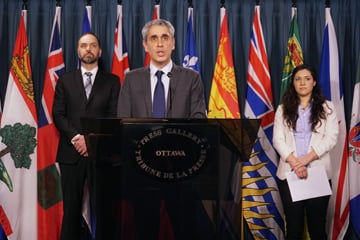A Toronto-based human rights program is urging Canada to stop detaining vulnerable migrants, including children and those with mental illness, as Canada is approaching its third Universal Periodic Review on human rights by the United Nations Human Rights Council.

A Toronto-based human rights group is urging Canada to stop detaining vulnerable migrants, including children and those with mental illness, as Canada is approaching its third Universal Periodic Review on human rights by the United Nations Human Rights Council.
Today, the International Human Rights Program, which supports law students in the University of Toronto’s Faculty of Law, in conjunction with several national and international human rights groups (including Amnesty International, the Canadian Civil Liberties Association, the Canadian Association of Refugee Lawyers and more) administered a joint submission to the United Nations expressing that the use of detention on innocent migrants is a violation of human rights, especially because the conditions negatively impact mental health.
Organizations also involved in the submission include Justice for Children and Youth, the British Columbia Civil Liberties Association and the Refugee Law Office of Legal Aid Ontario. Human Rights Watch endorsed these recommendations too.
“Depriving people of their liberty is the most invasive act that a state can take against a person,” says Hanna Gros, one of the authors of the UN submission and a pro bono advocate at IHRP. “We need to appreciate the human experience in the system and realize what the system is doing to vulnerable people.”
Echoing this sentiment is Samer Muscati, director of IHRP. He says that since working with mentally ill migrants who have been or are detained, what the group found was so “alarming” that they decided to dedicate more resources to further examine the issue so they could “address the system by looking at it from different ways.”
“This is actually our second submission to the Universal Periodic Review. We did one five years ago looking at women who have been incarcerated,” says Muscati.
According to IHRP, they say that medical experts have connected immigration detention with the onset or worsening of depression, anxiety, post-traumatic stress disorder and thoughts of suicide, causing lasting psychological harm.
“What we’ve learned from our research in speaking with families and observing them in immigration detention is that it has very significant, harmful effects for children and for their parents,” says Rachel Cronick, a psychiatrist at Jewish General Hospital and associate professor at McGill University in Montreal.
Since detention unto vulnerable and innocent migrants is considered inhumane, Gros says that there are other ways the Canadian government could monitor the whereabouts of migrants, inspired by other jurisdictions, rather than locking them up until their immigration proceeding, often in provincial prisons.
Gros and Muscati suggested some of the potential solutions mentioned in the submission: reporting obligations for migrants to check-in or having a guarantor to put up money to ensure the migrant attends their hearing (almost like the bail system), for instance.
“We just want to make sure that [the submission recommendations] move quickly so that people aren’t anguished unnecessarily in these difficult circumstances,” says Muscati.
IHRP based this submission on three years of their research, which has yielded three reports since 2015: “We Have No Rights: Arbitrary imprisonment and cruel treatment of migrants with mental health issues in Canada”; “No Life for a Child: A Roadmap to End Immigration Detention of Children and Family Separation”; and “Invisible Citizens: Canadian Children in Immigration Detention.”
“We need to humanize human rights and realize what a human rights violation looks and feels like on a real person. I think that’s when we’ll appreciate how urgently we need to change this system,” says Gros.










